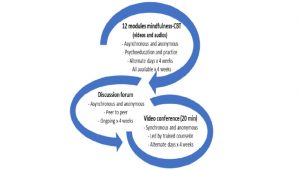Reduce Anxiety and Depression in College Student with an Online Mindfulness Virtual Community
By John M. de Castro, Ph.D.
“Student life can be stressful, but that doesn’t mean students have to let stress take over their lives. By incorporating mindfulness and meditation into daily routines, students can not only relieve the pressure, but also improve their memory, focus and ultimately their grades.” – Kenya McCullum
There is a lot of pressure on university students to excel so that they can get the best jobs after graduation. This stress might in fact be counterproductive as the increased pressure can actually lead to stress and anxiety which can impede the student’s physical and mental health, well-being, and school performance. Mindfulness training has been shown through extensive research to be effective in improving physical and psychological health. Indeed, these practices have been found to improve psychological health in college students.
The vast majority of the mindfulness training techniques, however, require a trained therapist. This results in costs that many clients can’t afford. In addition, the participants must be available to attend multiple sessions at particular scheduled times that may or may not be compatible with their busy schedules and at locations that may not be convenient. As an alternative, mindfulness training over the internet have been developed. These have tremendous advantages in decreasing costs, making training schedules much more flexible, and eliminating the need to go repeatedly to specific locations. In addition, research has indicated that mindfulness training online can be effective for improving the health and well-being of the participants.
In today’s Research News article “Effectiveness of an 8-Week Web-Based Mindfulness Virtual Community Intervention for University Students on Symptoms of Stress, Anxiety, and Depression: Randomized Controlled Trial.” (See summary below or view the full text of the study at: https://www.ncbi.nlm.nih.gov/pmc/articles/PMC7395254/) El Morr and colleagues recruited undergraduate students and randomly assigned them to either a wait-list control condition or to receive an 8 week online mindfulness virtual community program. The program incorporated brief online modules on mindfulness and student issues, online group discussions, and moderated 20-minute online videoconferences on mindfulness. The participants were measured before and after training for depression, anxiety, perceived stress, and mindfulness.
They found that compared to baseline and the waitlist control condition, participants in the online mindfulness virtual community had significantly higher mindfulness and significantly lower levels of depression and anxiety, with medium to large effect sizes. These findings suggest that online group training in mindfulness improves the mental health of college students.
College can be a difficult and stressful time for the students. There is pressure to perform academically while in a novel environment outside of the family with social pressures. This study suggests that the students can be helped in their adjustment with online mindfulness training, improving their psychological health. More research is needed, however, to determine if the mindfulness training produces not just short-term but lasting benefits for the students.
So, reduce anxiety and depression in college student with an online mindfulness virtual community.
“Learning how to meditate and be more mindful was one of the best things I’ve done as a student here. I’ve struggled with anxiety for many years, and became really overwhelmed by everything by my sophomore year. My grades started to fall as I slept less and tried to take on more and more. I’m so thankful for the skills I learned in this class. It’s not only made me a better student, but it’s also made me a happier person!”
CMCS – Center for Mindfulness and Contemplative Studies
This and other Contemplative Studies posts are also available on Google+ https://plus.google.com/106784388191201299496/posts and on Twitter @MindfulResearch
Study Summary
El Morr, C., Ritvo, P., Ahmad, F., Moineddin, R., & MVC Team (2020). Effectiveness of an 8-Week Web-Based Mindfulness Virtual Community Intervention for University Students on Symptoms of Stress, Anxiety, and Depression: Randomized Controlled Trial. JMIR mental health, 7(7), e18595. https://doi.org/10.2196/18595
Abstract
Background
A student mental health crisis is increasingly acknowledged and will only intensify with the COVID-19 crisis. Given accessibility of methods with demonstrated efficacy in reducing depression and anxiety (eg, mindfulness meditation and cognitive behavioral therapy [CBT]) and limitations imposed by geographic obstructions and localized expertise, web-based alternatives have become vehicles for scaled-up delivery of benefits at modest cost. Mindfulness Virtual Community (MVC), a web-based program informed by CBT constructs and featuring online videos, discussion forums, and videoconferencing, was developed to target depression, anxiety, and experiences of excess stress among university students.
Objective
The aim of this study was to assess the effectiveness of an 8-week web-based mindfulness and CBT program in reducing symptoms of depression, anxiety, and stress (primary outcomes) and increasing mindfulness (secondary outcome) within a randomized controlled trial (RCT) with undergraduate students at a large Canadian university.
Methods
An RCT was designed to assess undergraduate students (n=160) who were randomly allocated to a web-based guided mindfulness–CBT condition (n=80) or to a waitlist control (WLC) condition (n=80). The 8-week intervention consisted of a web-based platform comprising (1) 12 video-based modules with psychoeducation on students’ preidentified life challenges and applied mindfulness practice; (2) anonymous peer-to-peer discussion forums; and (3) anonymous, group-based, professionally guided 20-minute live videoconferences. The outcomes (depression, anxiety, stress, and mindfulness) were measured via an online survey at baseline and at 8 weeks postintervention using the Patient Health Questionnaire-9 (PHQ9), the Beck Anxiety Inventory (BAI), the Perceived Stress Scale (PSS), and the Five Facets Mindfulness Questionnaire Short Form (FFMQ-SF). Analyses employed generalized estimation equation methods with AR(1) covariance structures and were adjusted for possible covariates (gender, age, country of birth, ethnicity, English as first language, paid work, unpaid work, relationship status, physical exercise, self-rated health, and access to private mental health counseling).
Results
Of the 159 students who provided T1 data, 32 were males and 125 were females with a mean age of 22.55 years. Participants in the MVC (n=79) and WLC (n=80) groups were similar in sociodemographic characteristics at T1 with the exception of gender and weekly hours of unpaid volunteer work. At postintervention follow-up, according to the adjusted comparisons, there were statistically significant between-group reductions in depression scores (β=–2.21, P=.01) and anxiety scores (β=–4.82, P=.006), and a significant increase in mindfulness scores (β=4.84, P=.02) compared with the WLC group. There were no statistically significant differences in perceived stress for MVC (β=.64, P=.48) compared with WLC.
Conclusions
With the MVC intervention, there were significantly reduced depression and anxiety symptoms but no significant effect on perceived stress. Online mindfulness interventions can be effective in addressing common mental health conditions among postsecondary populations on a large scale, simultaneously reducing the current burden on traditional counseling services.
https://www.ncbi.nlm.nih.gov/pmc/articles/PMC7395254/









